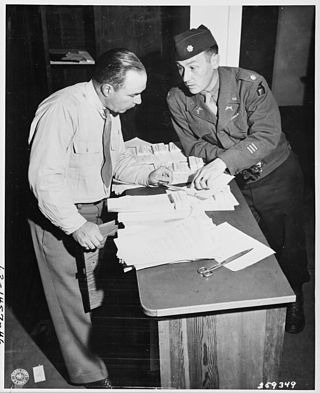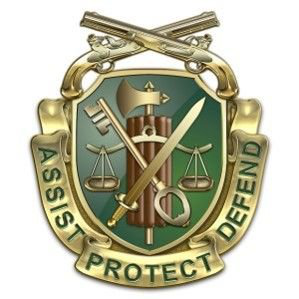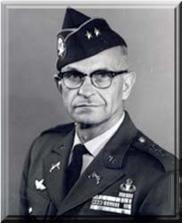Related Research Articles

Military police (MP) are law enforcement agencies connected with, or part of, the military of a state. In wartime operations, the military police may support the main fighting force with force protection, convoy security, screening, rear reconnaissance, logistic traffic management, counterinsurgency, and detainee handling.

During the American Civil War, the United States Army, the land force that fought to preserve the collective Union of the states, was often referred to as the Union Army, the Federal Army or the Northern Army. It proved essential to the restoration and preservation of the United States as a working, viable republic.

Provost marshal is a title given to a person in charge of a group of Military Police (MP). The title originated with an older term for MPs, provosts, from the Old French prévost. While a provost marshal is now usually a senior commissioned officer, they may be a person of any rank who commands any number of MPs; historically, the title was sometimes applied to civilian officials, especially under conditions of martial law, or when a military force had day-to-day responsibility for some or all aspects of civilian law enforcement. A provost marshal may also oversee security services, imprisonment, fire/emergency services and ambulances.
General of the Army is a five-star general officer rank in the United States Army. It is generally equivalent to the rank of Field Marshal in other countries. In the United States, a General of the Army ranks above generals and is equivalent to a fleet admiral and a general of the Air Force. The General of the Army insignia consisted of five 3⁄8-inch (9.5 mm) stars in a pentagonal pattern, with touching points. The insignia was paired with the gold and enameled United States coat of arms on service coat shoulder loops. The silver colored five-star metal insignia alone would be worn for use as a collar insignia of grade and on the garrison cap. Soft shoulder epaulets with five 7⁄16-inch (11 mm) stars in silver thread and gold-threaded United States coat of arms on green cloth were worn with shirts and sweaters.

Major General Enoch Herbert Crowder, USA was an American Army lawyer who served as the Judge Advocate General of the United States Army from 1911 to 1923. Crowder is most noted for implementing and administering the United States Selective Service Act of 1917, under which thousands of American men were drafted into military service during World War I.

The United States Army Military Police Corps (USAMPC) is the uniformed law enforcement branch of the United States Army. Investigations are conducted by Military Police Investigators under the Provost Marshal General's Office or Special Agents of the Department of the Army Criminal Investigation Division (CID).

James Barnet Fry was an American soldier and prolific author of historical books.

Marsena Rudolph Patrick was a college president and an officer in the United States Army, serving as a general in the Union volunteer forces during the American Civil War. He was the provost marshal for the Army of the Potomac in many of its campaigns.

The Veteran Reserve Corps was a military reserve organization created within the Union Army during the American Civil War to allow partially disabled or otherwise infirm soldiers to perform light duty, freeing non-disabled soldiers to serve on the front lines.

The Department of the Army Criminal Investigation Division (CID), previously known as the United States Army Criminal Investigation Command (USACIDC) is the primary federal law enforcement agency of the United States Department of the Army. Its primary function is to investigate felony crimes and serious violations of military law & the United States Code within the US Army. The division is a separate military investigative force with investigative autonomy; CID special agents, both military and civilian, report through the CID chain of command to the USACID Director, who reports directly to the Under Secretary of the Army and the Secretary of the Army. Unlike their counterparts at OSI and NCIS, Army CID does not have primary counterintelligence responsibilities.

Provosts are military police (MP) whose duties are policing solely within the armed forces of a country, as opposed to gendarmerie duties in the civilian population. However, many countries use their gendarmerie for provost duties.

The structure of the United States Army is complex, and can be interpreted in several different ways: active/reserve, operational/administrative, and branches/functional areas.

The provostmarshal general is a United States Army staff position that handles investigations of U.S. Army personnel. It is the highest-ranking provost marshal position in the U.S. Army, reporting to the Chief of Staff of the United States Army. The position brings all aspects of law enforcement in the U.S. Army in a single office.

The United States Marine Corps Criminal Investigation Division is a federal law enforcement agency that investigates crimes against people and property within the United States Marine Corps.

The Department of the Army Civilian Police (DACP) are the civilian federal law enforcement bodies of the Department of the Army of the United States of America. There is no centralized DACP agency, with all civilian law enforcement agencies of the Army falling under the “DACP” title. The DACP are controlled jointly by the Department of the Army and the Department of Defense and as such, they are commonly referred to as DoD Police.
The history of army policing in Great Britain dates back to the middle ages. However, the predecessor units to the modern Royal Military Police were only formed in the 1870s and 1880s, merging in 1926 and being granted their 'Royal' prefix in 1946.

Haydon LeMaire Boatner was a major general in the United States Army who served in World War II and the Korean War.

The 1st Military Police Brigade is a policing formation of the British Army, which is the only one-star command of the Royal Military Police. The brigade was formed in 2014, but due to be reduced to a Colonel's command in 2022 and re-structure by 2023.

Carl C. Turner was a Major general in the United States Army. His highest rank was as Army Provost Marshal General from 1964 to 1968; in that post he was involved in the responses to some of the major civil and political disturbances of the 1960s. Following his retirement from the Army, he served briefly as Chief, Executive Office for United States Marshals in 1969. In 1971 he pled guilty to charges of illegal firearms transactions and income tax evasion and was sentenced to three years in prison.
References
- ↑ ["OPMG Chart" (PDF Download)|https://www.army.mil/e2/c/downloads/453703.pdf]